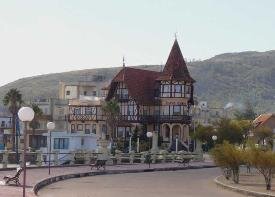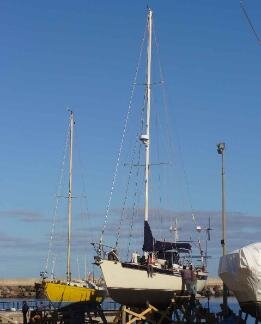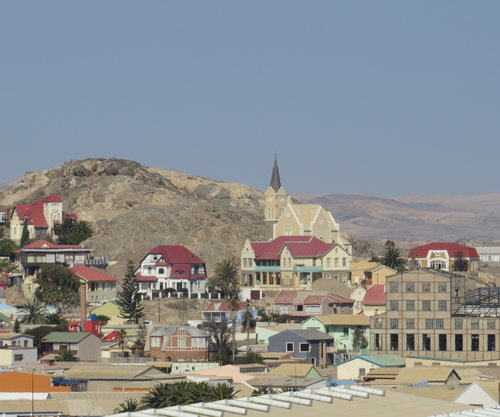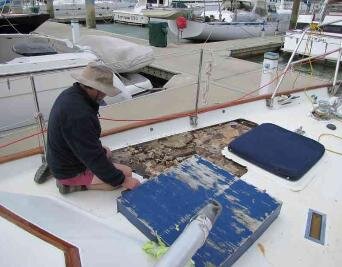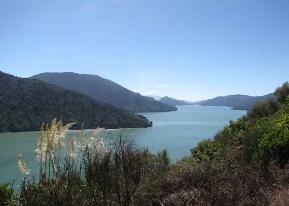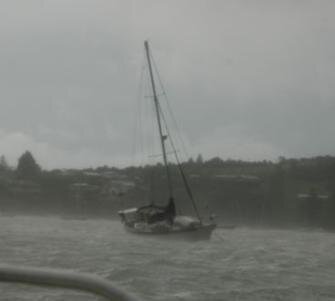Blue View – How Others Around the World are Coping with the Pandemic
/
Perhaps the best part of sailing was the friendship of so many wonderful people!
In our travels on Nine of Cups, we made lots of friends in many parts of the world, many of whom we’ve stayed in touch with over the years. Some were fellow sailors whose paths crossed ours in some faraway port or anchorage. Often, we’d meet them again in some other part of the world and pick up where we left off, and while a few of these sailing friends are still aboard their sailboats, most have, like us, ‘swallowed the anchor’ somewhere. We also met and became friends with a number of people that lived in the ports we visited. We were endlessly gobsmacked at the hospitality extended to us by these wonderful folks.
We’ve been reaching out to these friends to see how they are faring with the Coronavirus Pandemic. We are certainly interested in how they are doing personally, but we are also curious about how their particular governments are addressing the pandemic. What are the rules and how strictly are they enforced? Are there shortages? What can and can’t they do? Here are some of their replies…
Uruguay
This small country, about the size of Missouri, is on the east coast of South America. It lies between Argentina and Brazil, and was one of our favorite ports of call. Uruguay is one of the most progressive, yet ‘tranquilo’ countries in South America. The health care is first rate, the supermarkets are large and modern, the roads are good and the people we met were warm and friendly. We stopped at the small town of Piriapolis in 2006 to haul Nine of Cups for repairs and her annual maintenance and then visited again in 2007. On our first visit, we met two wonderful people, Martha and Luis, both retired physicians. They invited us to their home, gave us a tour of their vineyard, and shared their great country with us. Here’s what Luis said… “In Uruguay, the first case of Covid-19 was diagnosed on March 13. Since then we have done 29,939 tests; 655 were positive, 442 have recovered, 196 are still infected and 17 have died. At the moment there are 10 patients in intensive care. In our country The lockdown was not mandatory, but people take the precautions that are advised. The schools were closed immediately after the pandemic began. The schools in Montevideo remain closed, but schools in the smaller towns have re- opened. There are no shortages in the supermarkets. In Uruguay, we have a good health system and all citizens are covered. We have 500 ICU beds, but the maximum we used was 15. Martha and I stay at home because we are 80 and 82. We have a good quality of life, but our biggest problem is that we cannot be in personal contact with our family and friends. Hugs, Martha and Luis.”
Namibia
This country on the west coast of Africa is known for its diamonds. There was a time when prospectors could walk around under a full moon and pick the sparkling diamonds up off the ground. They’re a little harder to find now, but diamond mining is still a big industry. When I think of Namibia, huge sand dunes, the immense Namib desert with long stretches between oases, and wonderful coastal towns come to mind. We toured Namibia by car on our first visit to Africa on Nine of Cups. On our second visit, we put in at the port of Luderitz. Very few sailboats stop here, and for most of our stay, we were the only foreign-flagged vessel in the anchorage among the dozens of local diamond mining boats. We made a number of friends, but Liz was special. She invited us to her house several times and fed us gourmet meals… but we could never quite convince her to take the dinghy ride out to Cups. Here is what she said about the pandemic there…
“We have had a "State of Emergency" in Namibia since early March or end February (can't remember exactly when) once the first 2 infected people were diagnosed.They were tourists and were immediately hospitalized in Windhoek. All the smaller borders were closed immediately to traffic and only the main entry points were left open for a while. Only vehicles carrying essential foodstuff, etc. were allowed through. All travel by Air and Road in or out of the country was stopped. Almost all the Covid cases identified were tourists. So far Namibia has been blessed. To my knowledge we have had 16 diagnosed cases - the last I heard 8 or 9 had recovered and the others were still infected. People repatriated from South Africa and overseas were all put in mandatory quarantine for 2 - 3 weeks at facilities organized by Government.
The next stage was that two regions, Erongo (West of Windhoek to the central coast) and Khomas (Windhoek and surrounds) were on "lockdown" but the rest of the country was only under State of Emergency regulations. Non-essential businesses were closed and all restaurants (could only supply take-aways), pubs, and all alcohol outlets, and, as the number of people allowed to travel was almost NIL Guest Houses, Lodges and Hotels had to close. Eventually the whole country was on "lockdown". Our business, as you can well imagine, has also been hard-hit by this as we rely on Tourism for income. Very few locals shop for what we sell!!
Since Tuesday, May 5th we are in what they are calling Stage 2 of the State of Emergency which means that the "lockdown" has been lifted and people can now travel around Namibia without problem but not over the border and no incoming traffic. Domestic flights have also resumed from today. We still have to comply with social distancing and the wearing of masks when in public spaces is mandatory (which wasn't before!!!) Public Transport and Taxis may only carry 1/2 the number of passengers that they are licenced to carry. Our shop is open but shorter hours. Certain businesses still have to remain closed - especially if they sell alcohol!!! Difficult for many - but the President said that he hopes that it will curb the problem Namibia has with alcoholism - will it?????
Some people here have really "locked" themselves in their homes and are taking it very seriously but most seem to carry on almost as though life hasn't changed but I know we will be feeling it sometime. “
New Zealand
We visited this fabulous country twice, spending a total of 18 months there. Part of our time was devoted to boat projects and repairs, but we also sailed extensively – circumnavigating the north island one year and the entire country during the second visit. The country and scenery are gorgeous, and it’s no surprise that there is a large ex-pat American and British presence.Our good friend Ted, an American ex-pat who lives aboard his trimaran, has an interesting perspective on how the cruising/sailing community is coping with the pandemic. Here’s what he wrote: “Hi David and Marcie; New Zealand was an early lockdown country, as the government of Prime Minister Jacinda Ardern assessed the growing body of evidence regarding COVID. For a lot of us living on our boats, the “shelter in place” policy is relatively easy, as our voyaging has accustomed us to provisioning for isolation, and living within the confines of the edge of the deck. As this situation emerged, it became evident that the many yachts in NZ for the summer, avoiding the Pacific cyclone season, were going to be here much longer than they had planned for. Even if they were allowed to leave, the borders of all the Pacific Island nations are closed or severely restricted. I’m in touch with friends who are at anchor in Mexico, Panama, and the Marquesas, who can’t leave because there’s no place to go.
The rules here required that liveaboard yachts in marinas had to remain there, and if on a mooring were also restricted from moving other than to obtain supplies or shelter if extreme weather threatened. Pretty much the same applied to those at anchor. We were blessed with a benign autumn, with light, short rain events and no strong winds. In normal times, a boat can’t legally remain at anchor for more than 2 weeks without moving at least a kilometre, but for now, the less we move around the better for restricting contacts and tracing contacts in case of an infection. A halt was called on recreational boating, partly to insure that emergency services weren’t required to answer calls for assistance. This included use of dinghies other than to access supplies or services needed ashore by those living aboard. After a month of lockdown, we moved to “level 3”, which allowed stores and businesses not considered essential to open, with strict adherence to no contact and social distance. Still no parties, and no ball games!
With no prospects of leaving NZ for the winter, a lot of the boat people are facing their first winter outside the tropics for years, or decades. I’ve been helping a few of them research ways to get heat on their boats before temperatures approach freezing. Good thing for them that we can still order things online, and an early start is a good idea! Demand is going to be high, and delivery times are notably slow. Everyone I know has found a list of things they had intended to do on their boats, and most found a way to get what was needed, so they filled the down time, and improved their boats!
That’s most of what comes to mind for now. Hope you’re faring well, and it’s good to see you productively using your online presence. I, and another friend who is a writer, posted a bunch of our old stories on FB, with fairly good response from readers. I might even write a little more, if I can stave off my depression at watching the American experiment fail.”
Interestingly, New Zealand has had only 17 deaths from Covid-19 and only two new cases were reported yesterday. They have pretty much eliminated it from their island nation and have started re-opening.
I’ve received more feedback from other parts of the world, and I will share it with you next week. In the meantime, stay safe.
BTW, if you want to visit all these places (virtually, of course), click on the Travelogue tab above and scroll down to the Destinations A-Z links.




